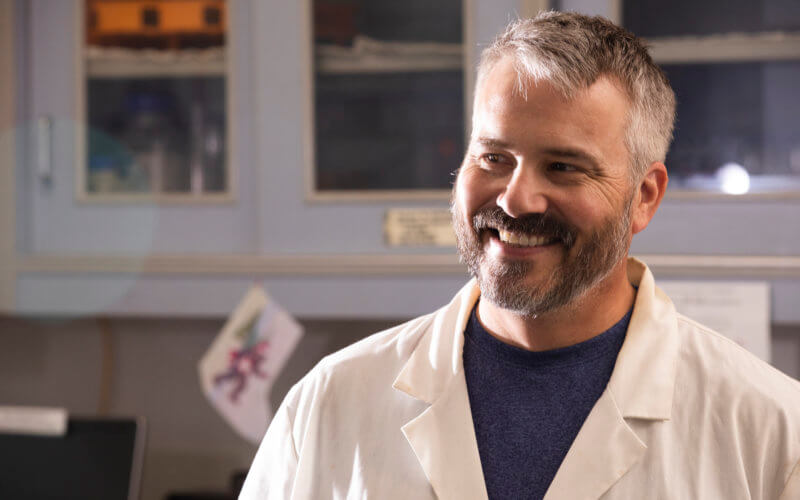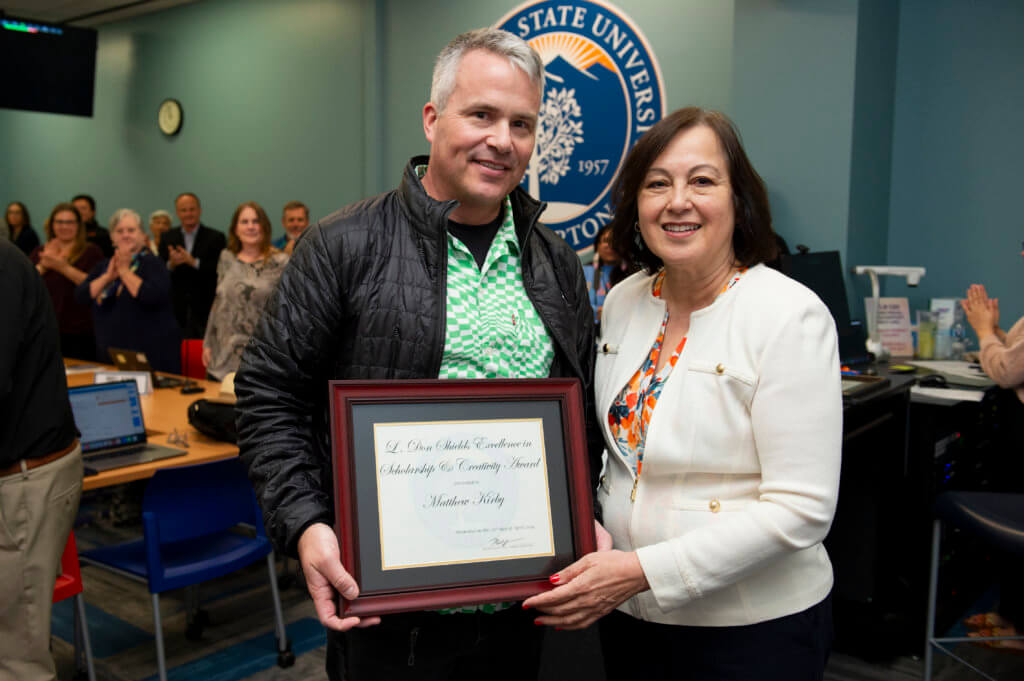
As one of the leading paleoclimatologists, Cal State Fullerton’s Matthew E. Kirby focuses on unraveling clues about California’s climate history over the past 120,000 years.
Kirby, professor of geological sciences, starts by collecting mud in long tubes from a natural lake and then analyzing the lake sediments in the lab to reconstruct past climate.
His research in paleoclimatology — the study of Earth’s past climate — is critical to informing the science and local communities about the implications future climate changes have on droughts, floods, strong atmospheric rivers and wildfires.
Over the past two decades, Kirby has established himself as a global expert on California’s past climate and is often sought by colleagues outside CSUF to collaborate on projects.
For his outstanding scholarship and impressive publication record, Kirby is the recipient of the university’s 2024 L. Don Shields Excellence in Scholarship and Creativity Award.

Kirby, who holds a doctorate in geology from Syracuse University, has had a long history of including his students in his research projects. He has advised 68 students — 50 undergraduates and 18 graduate students.
“It is always nice to be recognized for your work. But it is especially nice to be recognized knowing that your accomplishments are directly linked to student participation,” he said.
“I thank my students, my department, my college and the university for providing the support, the infrastructure, the passion and the ‘You can do it’ attitude that makes my research life at Cal State Fullerton possible.”
When he started at the university in 2002, Kirby discovered two things about the state’s past climate and natural lakes.
“First, and to my amazement, scientists knew very little about past climate in Southern California, despite California’s agriculture economy depending 100% on climate,” he said. “Second, I learned that rare natural lakes in California hold an untapped archive of past climate.”
Kirby, his students and colleagues have traveled thousands of miles across the state searching for clues in the mud of natural lakes to serve as proxies for past climate.
“As the years passed and my publications came to fruition, it became clear that my lab and students were filling a critical void in past climate information for a region of the United States where climate dictates our economic health,” Kirby said.
Adam Woods, chair and professor of geological sciences, called Kirby a “superstar” in the department.
“He is a generous and collegial presence in our department,” Woods said. “His research is critical in helping Southern Californians plan for and adapt to our future climate reality.”
Kirby has authored 60 publications in esteemed peer-reviewed scientific journals. His publications in geoscience, paleoclimatology and paleolimnology (the study of past lakes), detailing the changing climates of California, include many of his students as co-authors.
These publications have resulted from his consistent record of external funding, which totals about $1.5 million, including National Science Foundation grants.
“Dr. Kirby exemplifies excellence in scholarship. His work speaks for itself in the field, and his reputation as a mentor is well-known within the university and beyond,” said Joe Carlin, associate professor of geological sciences. “Dr. Kirby has single-handedly put CSUF on the map in terms of paleoclimatology.”
Carlin noted that students’ publications influence their future careers in academia, research and industry, helping them stand out in graduate school and employment applications.
One of Kirby’s former research students, Jenifer Leidelmeijer ’21 (M.S. geology), a geologist at the U.S. Geological Survey, agreed.
“I can attest that I would not be where I am today without Dr. Kirby’s guidance and inclusion in his research,” she said.
“I was hired because of the research I conducted and the scientific contributions I made while working in Dr. Kirby’s lab. To this day, I strive to make meaningful contributions to the geosciences because of the exceptional mentorship I received from Dr. Kirby.”
Broxton W. Bird, associate professor in the Department of Earth Sciences at Indiana University–Purdue University Indianapolis, was also struck by Kirby’s drive as an academic researcher and mentor.
“During my time as a student of his, I was inspired and motivated by his passion, creativity, scholarly rigor and work ethic,” said Bird ’05 (M.S. geology).
Kirby has been involved with service to the broader scientific community, including presenting 64 invited talks and reviewing 144 papers for peer-reviewed journals and 95 grant reviews.
He was recently elected president of the Paleoceanography and Paleoclimatology section of the American Geophysical Union, a leading professional society within the geosciences.
“I take great pride in my service to my field and for including students at all levels of my research program,” Kirby said. “CSUF has been pivotal to my research success.”
The L. Don Shields Excellence in Scholarship and Creativity Award is presented to a faculty member to recognize outstanding scholarship and/or creative work demonstrated through various activities. The award’s namesake served from 1970-80 as the university’s second president.